Investigation Report: Health Care Access in Aboriginal Communities
VerifiedAdded on 2022/08/29
|10
|2162
|23
Report
AI Summary
This report presents a qualitative research proposal focused on healthcare access and health conditions within the Aboriginal community, specifically in the Torres Strait Island. The study aims to identify issues related to healthcare access, obesity rates, and community health knowledge through interviews. The research employs a grounded theory approach, utilizing open-ended questionnaires and interviews with a sample of 25-40 participants. The proposal details the study design, sampling methods, data collection procedures, and ethical considerations. It also includes a reflection on the researcher's motivation and relevant background. The report addresses the background of health disparities, the problem statement of inequitable healthcare access, and the research question about primary needs and opinions on obesity. The conclusion highlights the expected outcomes of the qualitative study, emphasizing its contribution to understanding and addressing the health needs of the Aboriginal community.
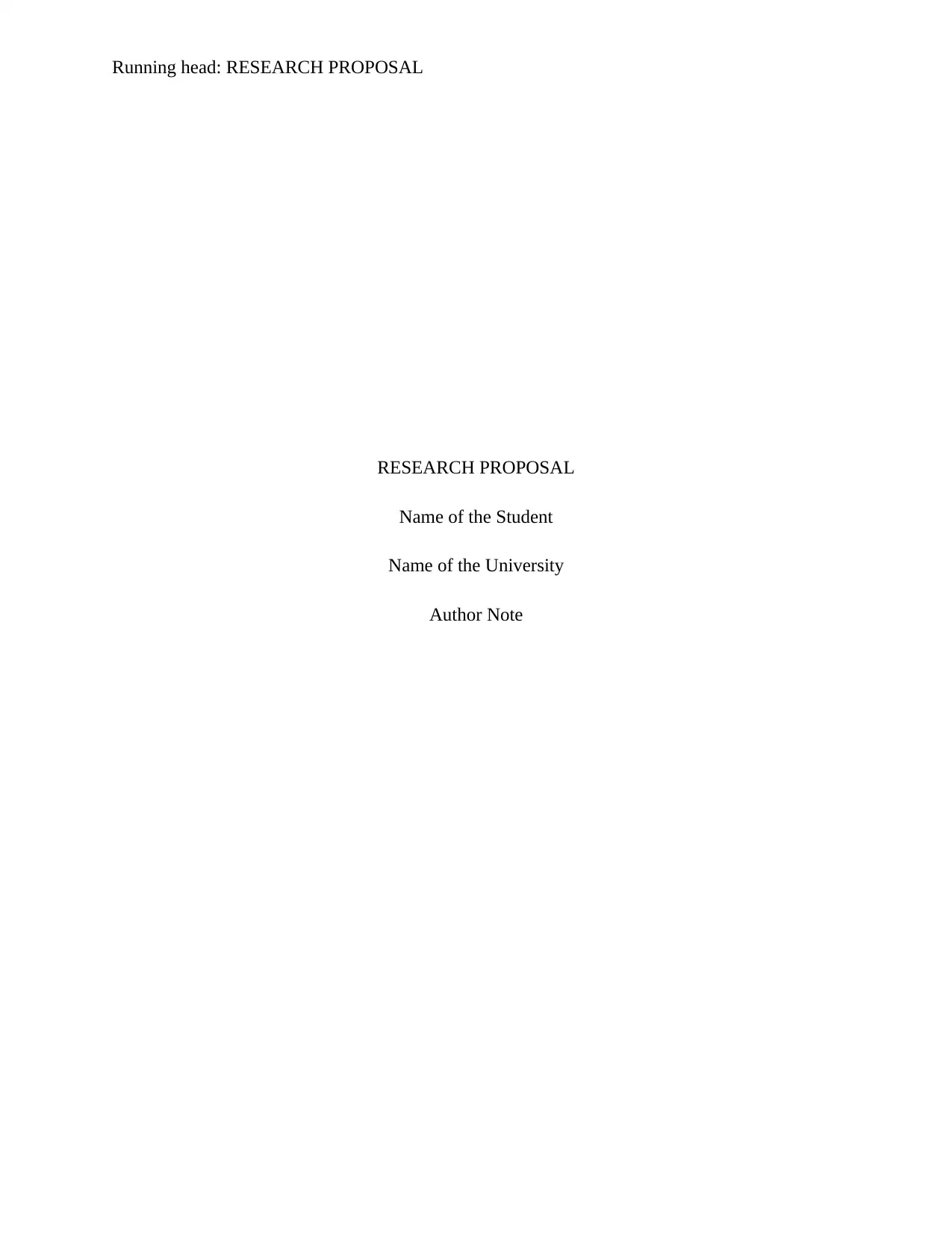
Running head: RESEARCH PROPOSAL
RESEARCH PROPOSAL
Name of the Student
Name of the University
Author Note
RESEARCH PROPOSAL
Name of the Student
Name of the University
Author Note
Paraphrase This Document
Need a fresh take? Get an instant paraphrase of this document with our AI Paraphraser
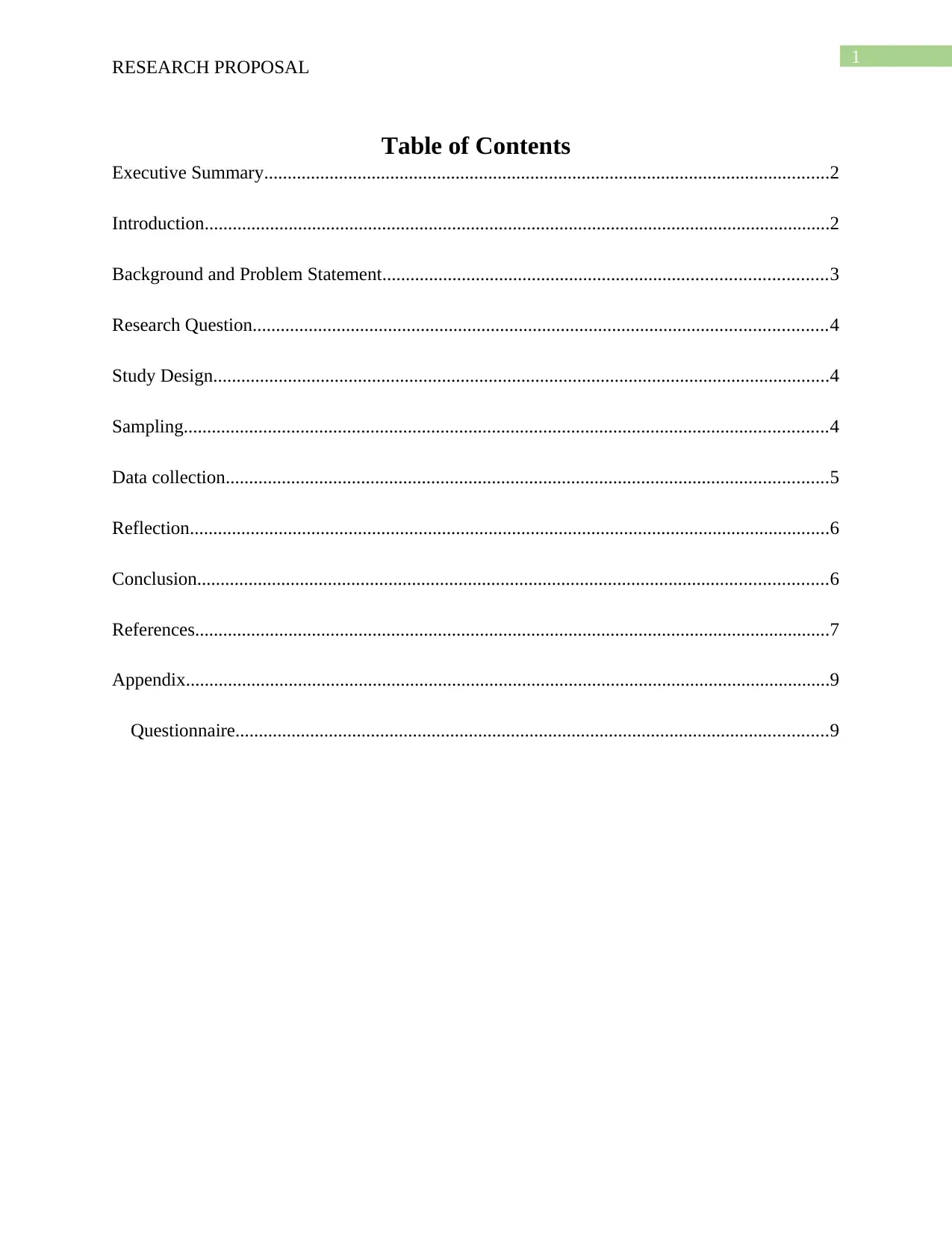
1
RESEARCH PROPOSAL
Table of Contents
Executive Summary.........................................................................................................................2
Introduction......................................................................................................................................2
Background and Problem Statement...............................................................................................3
Research Question...........................................................................................................................4
Study Design....................................................................................................................................4
Sampling..........................................................................................................................................4
Data collection.................................................................................................................................5
Reflection.........................................................................................................................................6
Conclusion.......................................................................................................................................6
References........................................................................................................................................7
Appendix..........................................................................................................................................9
Questionnaire...............................................................................................................................9
RESEARCH PROPOSAL
Table of Contents
Executive Summary.........................................................................................................................2
Introduction......................................................................................................................................2
Background and Problem Statement...............................................................................................3
Research Question...........................................................................................................................4
Study Design....................................................................................................................................4
Sampling..........................................................................................................................................4
Data collection.................................................................................................................................5
Reflection.........................................................................................................................................6
Conclusion.......................................................................................................................................6
References........................................................................................................................................7
Appendix..........................................................................................................................................9
Questionnaire...............................................................................................................................9
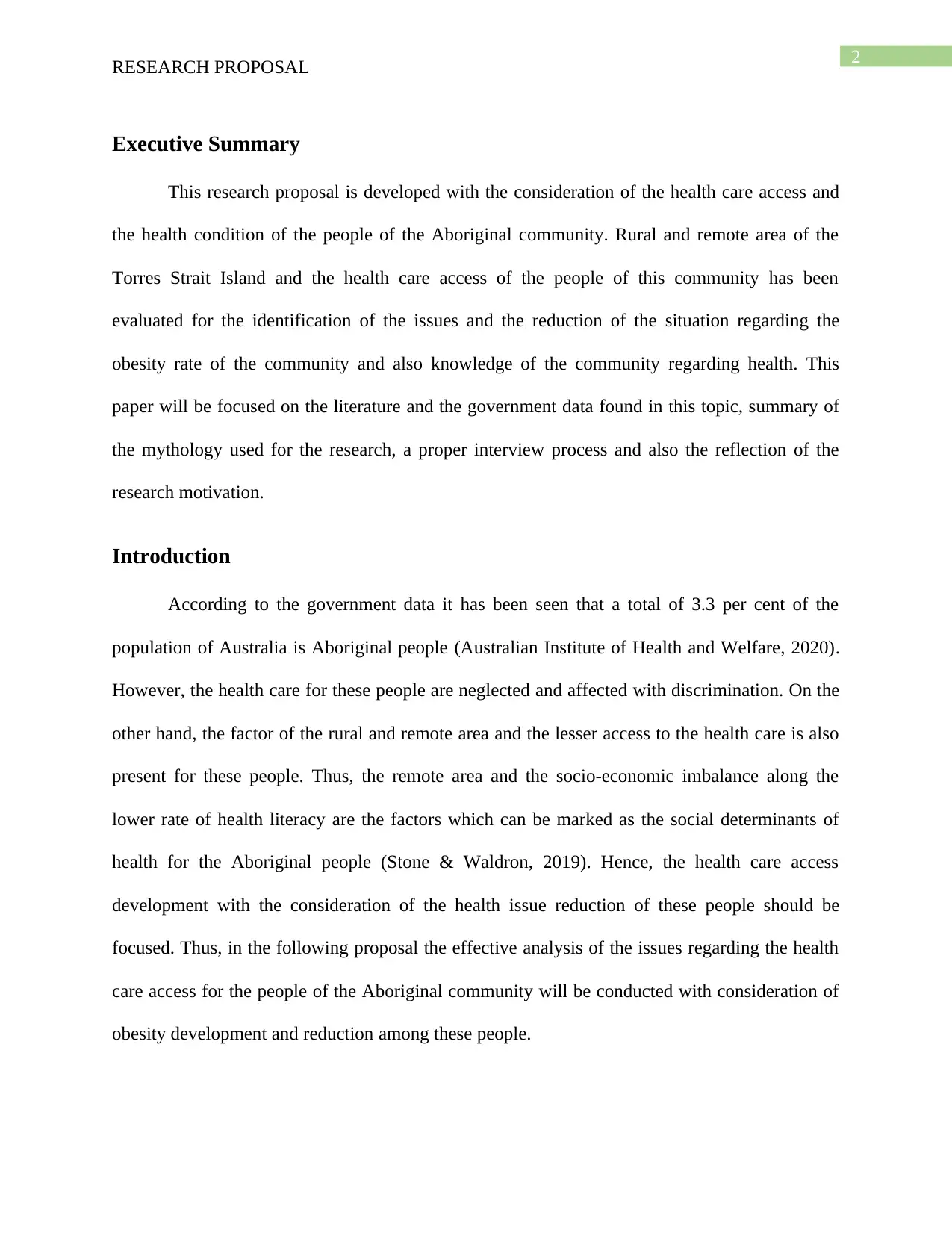
2
RESEARCH PROPOSAL
Executive Summary
This research proposal is developed with the consideration of the health care access and
the health condition of the people of the Aboriginal community. Rural and remote area of the
Torres Strait Island and the health care access of the people of this community has been
evaluated for the identification of the issues and the reduction of the situation regarding the
obesity rate of the community and also knowledge of the community regarding health. This
paper will be focused on the literature and the government data found in this topic, summary of
the mythology used for the research, a proper interview process and also the reflection of the
research motivation.
Introduction
According to the government data it has been seen that a total of 3.3 per cent of the
population of Australia is Aboriginal people (Australian Institute of Health and Welfare, 2020).
However, the health care for these people are neglected and affected with discrimination. On the
other hand, the factor of the rural and remote area and the lesser access to the health care is also
present for these people. Thus, the remote area and the socio-economic imbalance along the
lower rate of health literacy are the factors which can be marked as the social determinants of
health for the Aboriginal people (Stone & Waldron, 2019). Hence, the health care access
development with the consideration of the health issue reduction of these people should be
focused. Thus, in the following proposal the effective analysis of the issues regarding the health
care access for the people of the Aboriginal community will be conducted with consideration of
obesity development and reduction among these people.
RESEARCH PROPOSAL
Executive Summary
This research proposal is developed with the consideration of the health care access and
the health condition of the people of the Aboriginal community. Rural and remote area of the
Torres Strait Island and the health care access of the people of this community has been
evaluated for the identification of the issues and the reduction of the situation regarding the
obesity rate of the community and also knowledge of the community regarding health. This
paper will be focused on the literature and the government data found in this topic, summary of
the mythology used for the research, a proper interview process and also the reflection of the
research motivation.
Introduction
According to the government data it has been seen that a total of 3.3 per cent of the
population of Australia is Aboriginal people (Australian Institute of Health and Welfare, 2020).
However, the health care for these people are neglected and affected with discrimination. On the
other hand, the factor of the rural and remote area and the lesser access to the health care is also
present for these people. Thus, the remote area and the socio-economic imbalance along the
lower rate of health literacy are the factors which can be marked as the social determinants of
health for the Aboriginal people (Stone & Waldron, 2019). Hence, the health care access
development with the consideration of the health issue reduction of these people should be
focused. Thus, in the following proposal the effective analysis of the issues regarding the health
care access for the people of the Aboriginal community will be conducted with consideration of
obesity development and reduction among these people.
⊘ This is a preview!⊘
Do you want full access?
Subscribe today to unlock all pages.

Trusted by 1+ million students worldwide
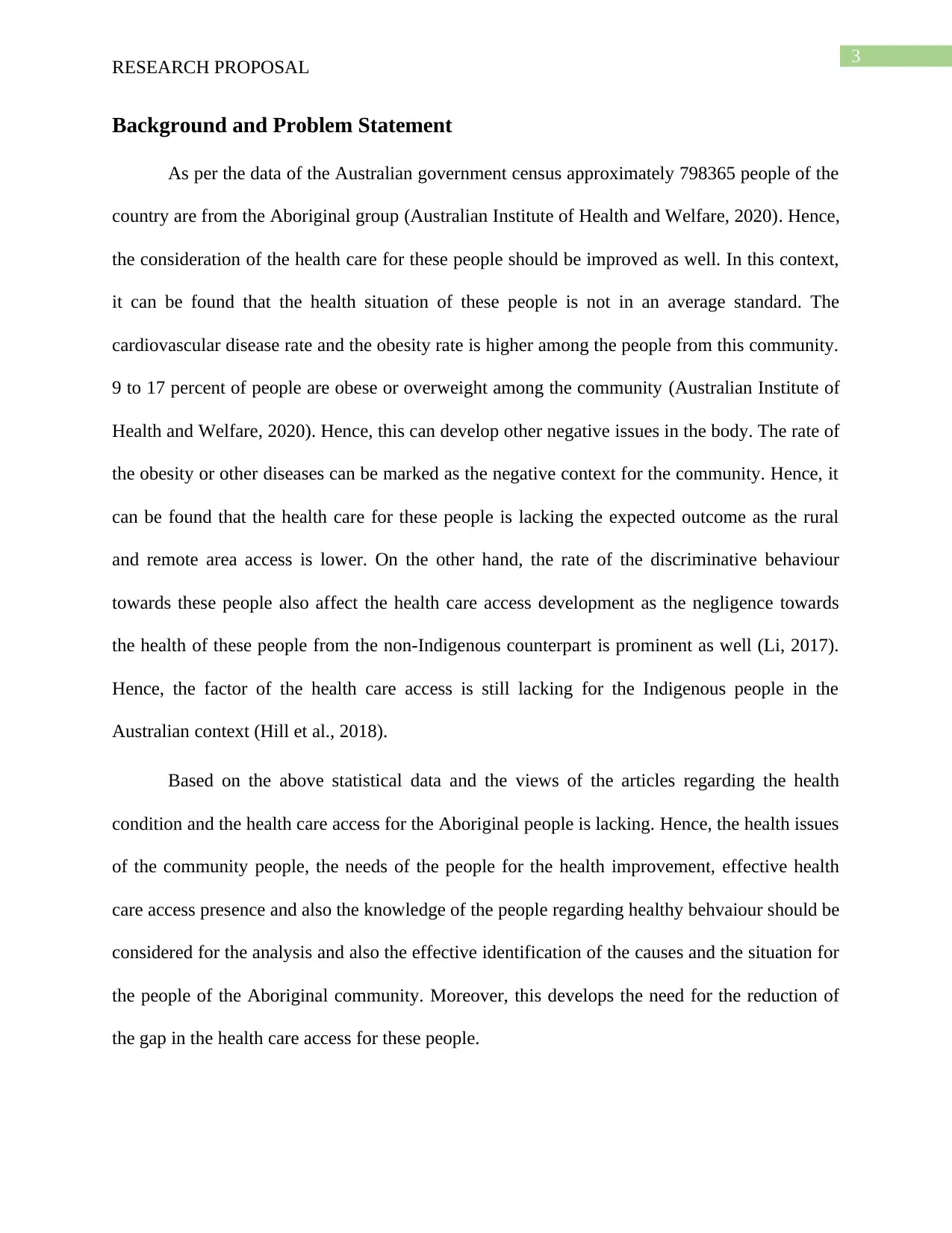
3
RESEARCH PROPOSAL
Background and Problem Statement
As per the data of the Australian government census approximately 798365 people of the
country are from the Aboriginal group (Australian Institute of Health and Welfare, 2020). Hence,
the consideration of the health care for these people should be improved as well. In this context,
it can be found that the health situation of these people is not in an average standard. The
cardiovascular disease rate and the obesity rate is higher among the people from this community.
9 to 17 percent of people are obese or overweight among the community (Australian Institute of
Health and Welfare, 2020). Hence, this can develop other negative issues in the body. The rate of
the obesity or other diseases can be marked as the negative context for the community. Hence, it
can be found that the health care for these people is lacking the expected outcome as the rural
and remote area access is lower. On the other hand, the rate of the discriminative behaviour
towards these people also affect the health care access development as the negligence towards
the health of these people from the non-Indigenous counterpart is prominent as well (Li, 2017).
Hence, the factor of the health care access is still lacking for the Indigenous people in the
Australian context (Hill et al., 2018).
Based on the above statistical data and the views of the articles regarding the health
condition and the health care access for the Aboriginal people is lacking. Hence, the health issues
of the community people, the needs of the people for the health improvement, effective health
care access presence and also the knowledge of the people regarding healthy behvaiour should be
considered for the analysis and also the effective identification of the causes and the situation for
the people of the Aboriginal community. Moreover, this develops the need for the reduction of
the gap in the health care access for these people.
RESEARCH PROPOSAL
Background and Problem Statement
As per the data of the Australian government census approximately 798365 people of the
country are from the Aboriginal group (Australian Institute of Health and Welfare, 2020). Hence,
the consideration of the health care for these people should be improved as well. In this context,
it can be found that the health situation of these people is not in an average standard. The
cardiovascular disease rate and the obesity rate is higher among the people from this community.
9 to 17 percent of people are obese or overweight among the community (Australian Institute of
Health and Welfare, 2020). Hence, this can develop other negative issues in the body. The rate of
the obesity or other diseases can be marked as the negative context for the community. Hence, it
can be found that the health care for these people is lacking the expected outcome as the rural
and remote area access is lower. On the other hand, the rate of the discriminative behaviour
towards these people also affect the health care access development as the negligence towards
the health of these people from the non-Indigenous counterpart is prominent as well (Li, 2017).
Hence, the factor of the health care access is still lacking for the Indigenous people in the
Australian context (Hill et al., 2018).
Based on the above statistical data and the views of the articles regarding the health
condition and the health care access for the Aboriginal people is lacking. Hence, the health issues
of the community people, the needs of the people for the health improvement, effective health
care access presence and also the knowledge of the people regarding healthy behvaiour should be
considered for the analysis and also the effective identification of the causes and the situation for
the people of the Aboriginal community. Moreover, this develops the need for the reduction of
the gap in the health care access for these people.
Paraphrase This Document
Need a fresh take? Get an instant paraphrase of this document with our AI Paraphraser
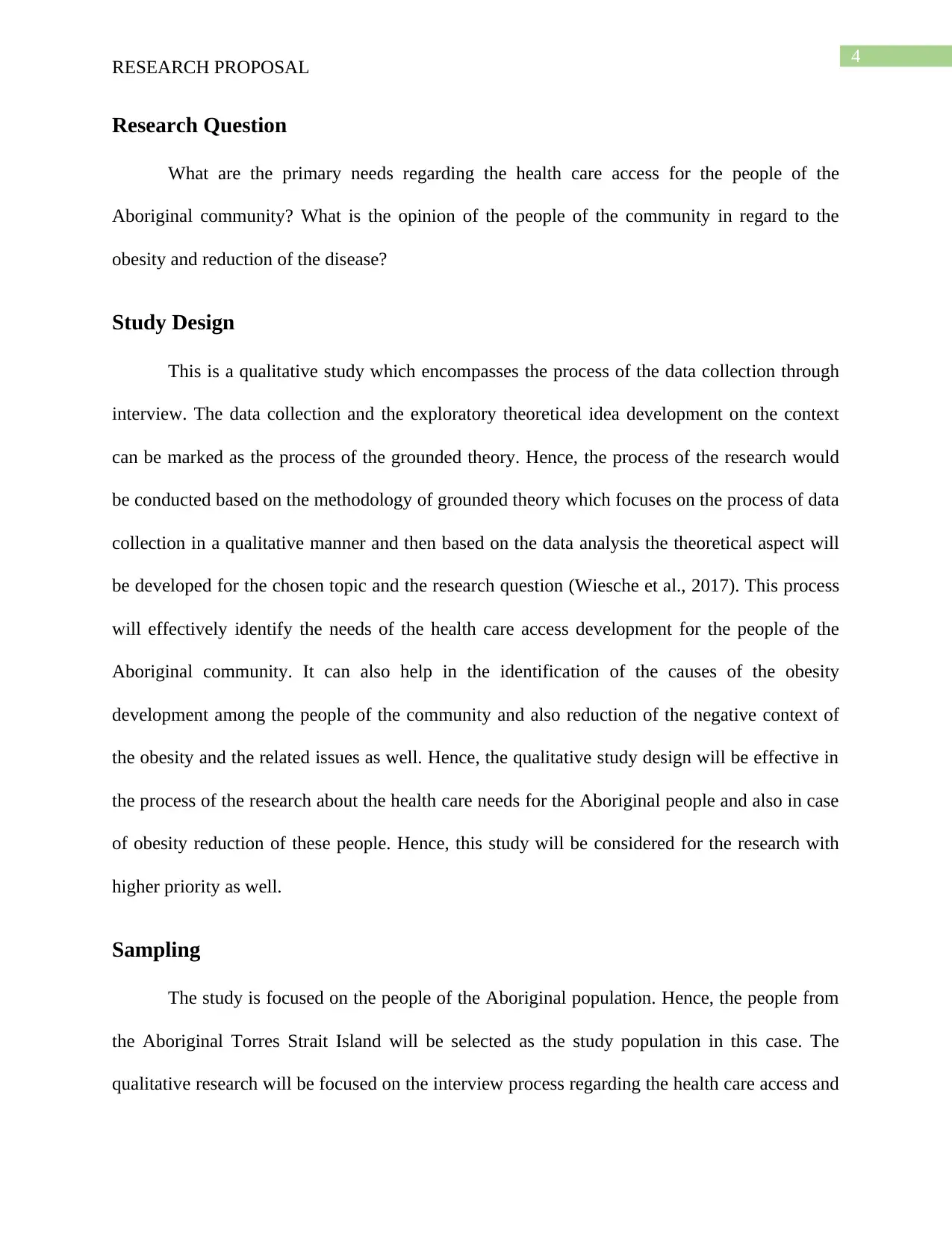
4
RESEARCH PROPOSAL
Research Question
What are the primary needs regarding the health care access for the people of the
Aboriginal community? What is the opinion of the people of the community in regard to the
obesity and reduction of the disease?
Study Design
This is a qualitative study which encompasses the process of the data collection through
interview. The data collection and the exploratory theoretical idea development on the context
can be marked as the process of the grounded theory. Hence, the process of the research would
be conducted based on the methodology of grounded theory which focuses on the process of data
collection in a qualitative manner and then based on the data analysis the theoretical aspect will
be developed for the chosen topic and the research question (Wiesche et al., 2017). This process
will effectively identify the needs of the health care access development for the people of the
Aboriginal community. It can also help in the identification of the causes of the obesity
development among the people of the community and also reduction of the negative context of
the obesity and the related issues as well. Hence, the qualitative study design will be effective in
the process of the research about the health care needs for the Aboriginal people and also in case
of obesity reduction of these people. Hence, this study will be considered for the research with
higher priority as well.
Sampling
The study is focused on the people of the Aboriginal population. Hence, the people from
the Aboriginal Torres Strait Island will be selected as the study population in this case. The
qualitative research will be focused on the interview process regarding the health care access and
RESEARCH PROPOSAL
Research Question
What are the primary needs regarding the health care access for the people of the
Aboriginal community? What is the opinion of the people of the community in regard to the
obesity and reduction of the disease?
Study Design
This is a qualitative study which encompasses the process of the data collection through
interview. The data collection and the exploratory theoretical idea development on the context
can be marked as the process of the grounded theory. Hence, the process of the research would
be conducted based on the methodology of grounded theory which focuses on the process of data
collection in a qualitative manner and then based on the data analysis the theoretical aspect will
be developed for the chosen topic and the research question (Wiesche et al., 2017). This process
will effectively identify the needs of the health care access development for the people of the
Aboriginal community. It can also help in the identification of the causes of the obesity
development among the people of the community and also reduction of the negative context of
the obesity and the related issues as well. Hence, the qualitative study design will be effective in
the process of the research about the health care needs for the Aboriginal people and also in case
of obesity reduction of these people. Hence, this study will be considered for the research with
higher priority as well.
Sampling
The study is focused on the people of the Aboriginal population. Hence, the people from
the Aboriginal Torres Strait Island will be selected as the study population in this case. The
qualitative research will be focused on the interview process regarding the health care access and
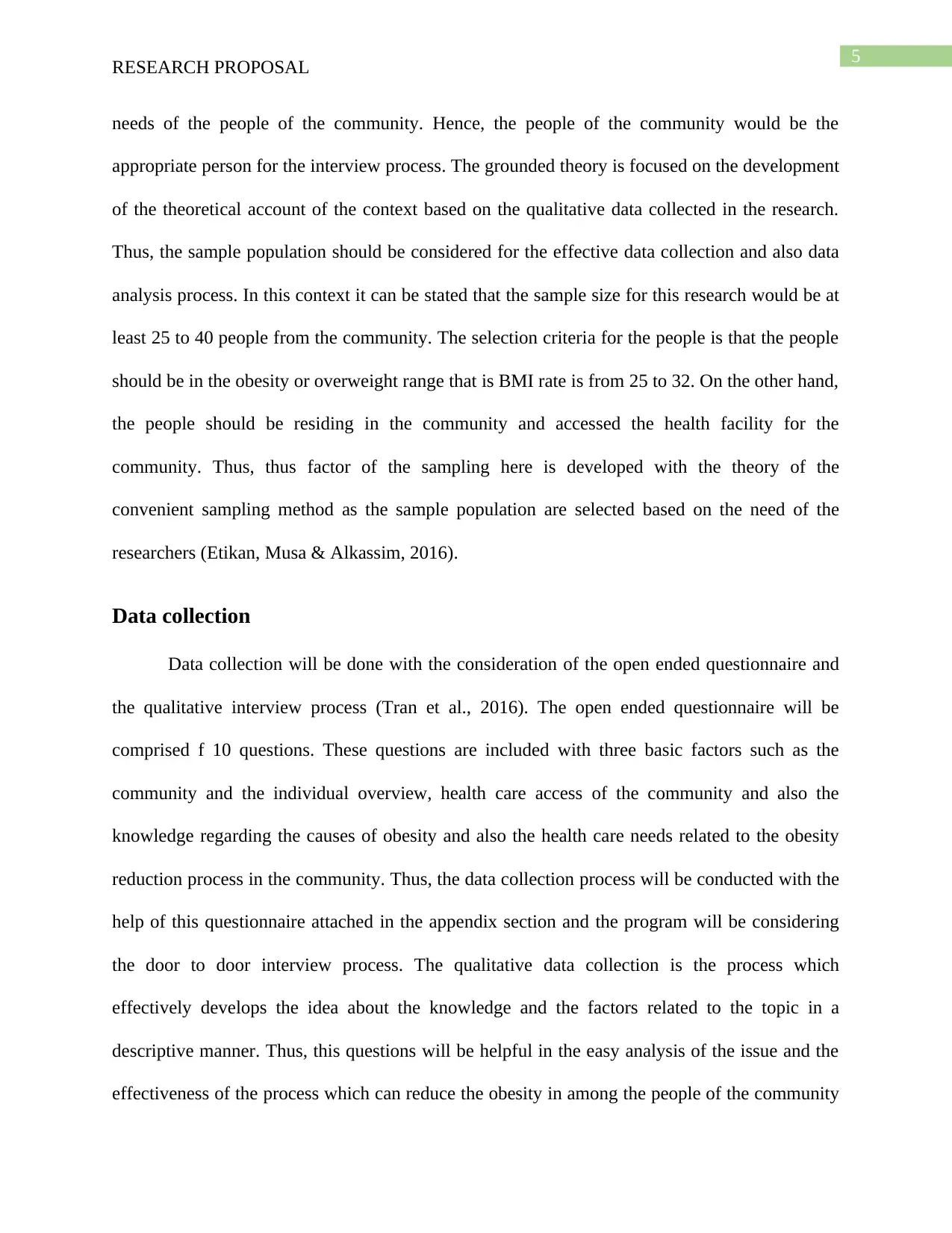
5
RESEARCH PROPOSAL
needs of the people of the community. Hence, the people of the community would be the
appropriate person for the interview process. The grounded theory is focused on the development
of the theoretical account of the context based on the qualitative data collected in the research.
Thus, the sample population should be considered for the effective data collection and also data
analysis process. In this context it can be stated that the sample size for this research would be at
least 25 to 40 people from the community. The selection criteria for the people is that the people
should be in the obesity or overweight range that is BMI rate is from 25 to 32. On the other hand,
the people should be residing in the community and accessed the health facility for the
community. Thus, thus factor of the sampling here is developed with the theory of the
convenient sampling method as the sample population are selected based on the need of the
researchers (Etikan, Musa & Alkassim, 2016).
Data collection
Data collection will be done with the consideration of the open ended questionnaire and
the qualitative interview process (Tran et al., 2016). The open ended questionnaire will be
comprised f 10 questions. These questions are included with three basic factors such as the
community and the individual overview, health care access of the community and also the
knowledge regarding the causes of obesity and also the health care needs related to the obesity
reduction process in the community. Thus, the data collection process will be conducted with the
help of this questionnaire attached in the appendix section and the program will be considering
the door to door interview process. The qualitative data collection is the process which
effectively develops the idea about the knowledge and the factors related to the topic in a
descriptive manner. Thus, this questions will be helpful in the easy analysis of the issue and the
effectiveness of the process which can reduce the obesity in among the people of the community
RESEARCH PROPOSAL
needs of the people of the community. Hence, the people of the community would be the
appropriate person for the interview process. The grounded theory is focused on the development
of the theoretical account of the context based on the qualitative data collected in the research.
Thus, the sample population should be considered for the effective data collection and also data
analysis process. In this context it can be stated that the sample size for this research would be at
least 25 to 40 people from the community. The selection criteria for the people is that the people
should be in the obesity or overweight range that is BMI rate is from 25 to 32. On the other hand,
the people should be residing in the community and accessed the health facility for the
community. Thus, thus factor of the sampling here is developed with the theory of the
convenient sampling method as the sample population are selected based on the need of the
researchers (Etikan, Musa & Alkassim, 2016).
Data collection
Data collection will be done with the consideration of the open ended questionnaire and
the qualitative interview process (Tran et al., 2016). The open ended questionnaire will be
comprised f 10 questions. These questions are included with three basic factors such as the
community and the individual overview, health care access of the community and also the
knowledge regarding the causes of obesity and also the health care needs related to the obesity
reduction process in the community. Thus, the data collection process will be conducted with the
help of this questionnaire attached in the appendix section and the program will be considering
the door to door interview process. The qualitative data collection is the process which
effectively develops the idea about the knowledge and the factors related to the topic in a
descriptive manner. Thus, this questions will be helpful in the easy analysis of the issue and the
effectiveness of the process which can reduce the obesity in among the people of the community
⊘ This is a preview!⊘
Do you want full access?
Subscribe today to unlock all pages.

Trusted by 1+ million students worldwide
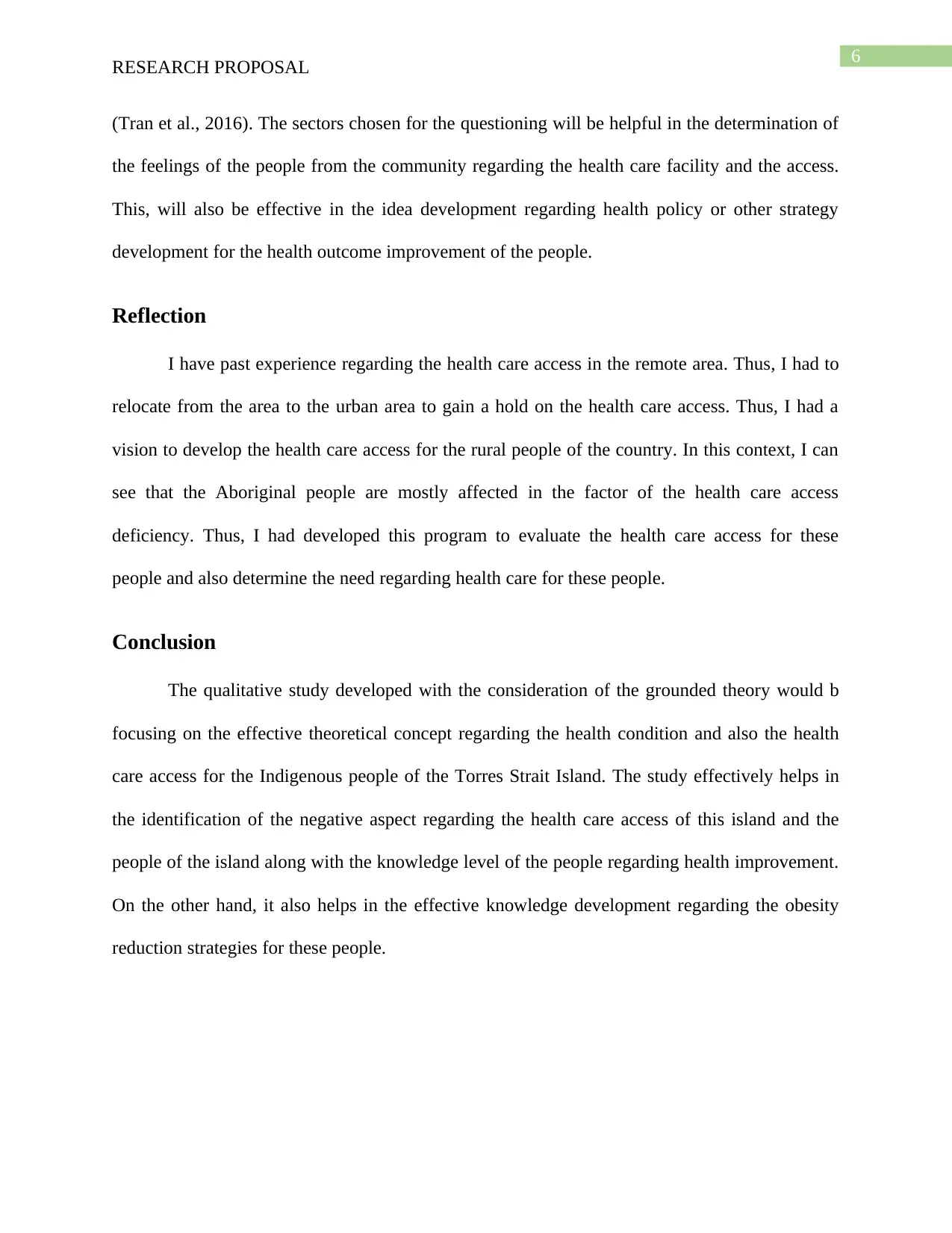
6
RESEARCH PROPOSAL
(Tran et al., 2016). The sectors chosen for the questioning will be helpful in the determination of
the feelings of the people from the community regarding the health care facility and the access.
This, will also be effective in the idea development regarding health policy or other strategy
development for the health outcome improvement of the people.
Reflection
I have past experience regarding the health care access in the remote area. Thus, I had to
relocate from the area to the urban area to gain a hold on the health care access. Thus, I had a
vision to develop the health care access for the rural people of the country. In this context, I can
see that the Aboriginal people are mostly affected in the factor of the health care access
deficiency. Thus, I had developed this program to evaluate the health care access for these
people and also determine the need regarding health care for these people.
Conclusion
The qualitative study developed with the consideration of the grounded theory would b
focusing on the effective theoretical concept regarding the health condition and also the health
care access for the Indigenous people of the Torres Strait Island. The study effectively helps in
the identification of the negative aspect regarding the health care access of this island and the
people of the island along with the knowledge level of the people regarding health improvement.
On the other hand, it also helps in the effective knowledge development regarding the obesity
reduction strategies for these people.
RESEARCH PROPOSAL
(Tran et al., 2016). The sectors chosen for the questioning will be helpful in the determination of
the feelings of the people from the community regarding the health care facility and the access.
This, will also be effective in the idea development regarding health policy or other strategy
development for the health outcome improvement of the people.
Reflection
I have past experience regarding the health care access in the remote area. Thus, I had to
relocate from the area to the urban area to gain a hold on the health care access. Thus, I had a
vision to develop the health care access for the rural people of the country. In this context, I can
see that the Aboriginal people are mostly affected in the factor of the health care access
deficiency. Thus, I had developed this program to evaluate the health care access for these
people and also determine the need regarding health care for these people.
Conclusion
The qualitative study developed with the consideration of the grounded theory would b
focusing on the effective theoretical concept regarding the health condition and also the health
care access for the Indigenous people of the Torres Strait Island. The study effectively helps in
the identification of the negative aspect regarding the health care access of this island and the
people of the island along with the knowledge level of the people regarding health improvement.
On the other hand, it also helps in the effective knowledge development regarding the obesity
reduction strategies for these people.
Paraphrase This Document
Need a fresh take? Get an instant paraphrase of this document with our AI Paraphraser
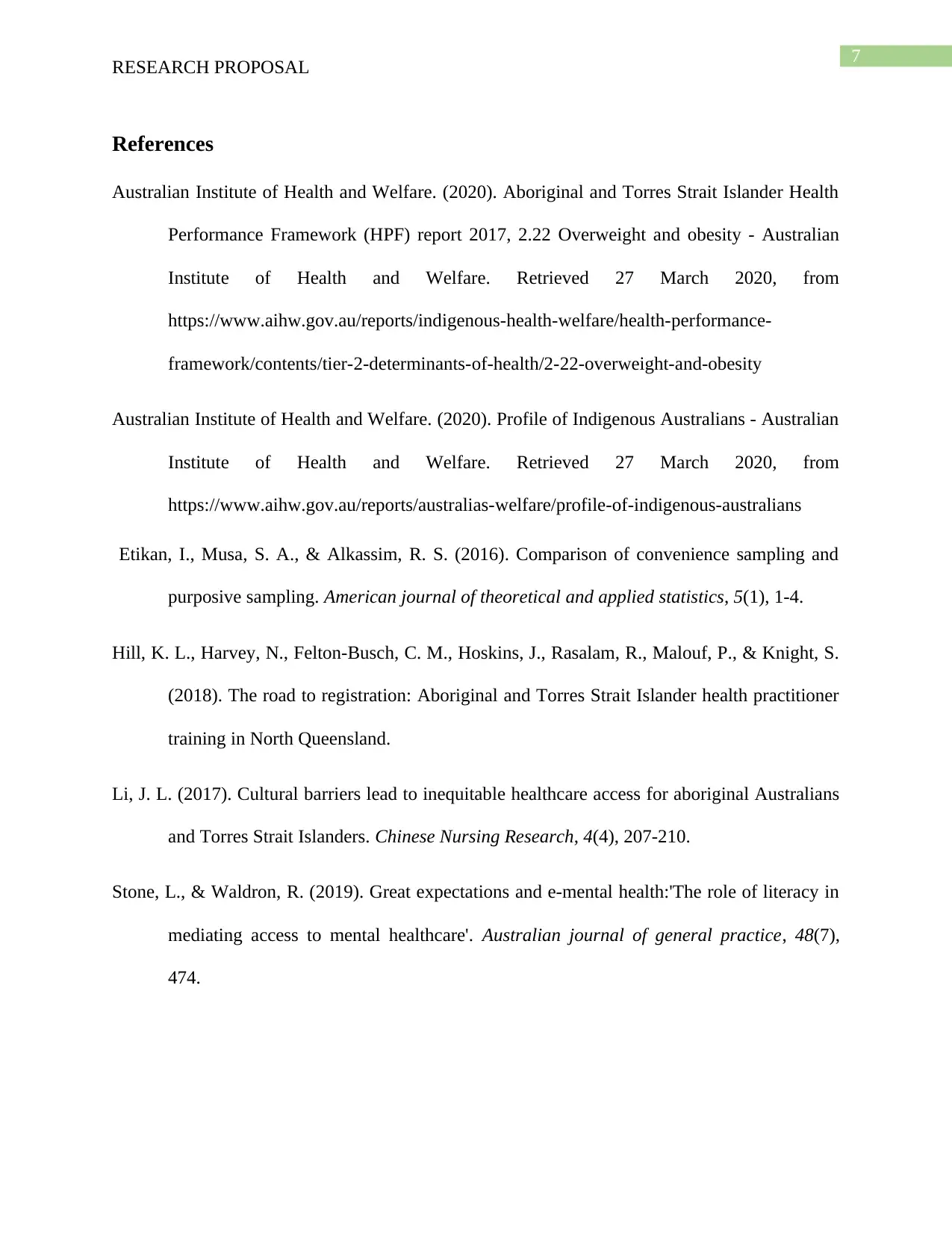
7
RESEARCH PROPOSAL
References
Australian Institute of Health and Welfare. (2020). Aboriginal and Torres Strait Islander Health
Performance Framework (HPF) report 2017, 2.22 Overweight and obesity - Australian
Institute of Health and Welfare. Retrieved 27 March 2020, from
https://www.aihw.gov.au/reports/indigenous-health-welfare/health-performance-
framework/contents/tier-2-determinants-of-health/2-22-overweight-and-obesity
Australian Institute of Health and Welfare. (2020). Profile of Indigenous Australians - Australian
Institute of Health and Welfare. Retrieved 27 March 2020, from
https://www.aihw.gov.au/reports/australias-welfare/profile-of-indigenous-australians
Etikan, I., Musa, S. A., & Alkassim, R. S. (2016). Comparison of convenience sampling and
purposive sampling. American journal of theoretical and applied statistics, 5(1), 1-4.
Hill, K. L., Harvey, N., Felton-Busch, C. M., Hoskins, J., Rasalam, R., Malouf, P., & Knight, S.
(2018). The road to registration: Aboriginal and Torres Strait Islander health practitioner
training in North Queensland.
Li, J. L. (2017). Cultural barriers lead to inequitable healthcare access for aboriginal Australians
and Torres Strait Islanders. Chinese Nursing Research, 4(4), 207-210.
Stone, L., & Waldron, R. (2019). Great expectations and e-mental health:'The role of literacy in
mediating access to mental healthcare'. Australian journal of general practice, 48(7),
474.
RESEARCH PROPOSAL
References
Australian Institute of Health and Welfare. (2020). Aboriginal and Torres Strait Islander Health
Performance Framework (HPF) report 2017, 2.22 Overweight and obesity - Australian
Institute of Health and Welfare. Retrieved 27 March 2020, from
https://www.aihw.gov.au/reports/indigenous-health-welfare/health-performance-
framework/contents/tier-2-determinants-of-health/2-22-overweight-and-obesity
Australian Institute of Health and Welfare. (2020). Profile of Indigenous Australians - Australian
Institute of Health and Welfare. Retrieved 27 March 2020, from
https://www.aihw.gov.au/reports/australias-welfare/profile-of-indigenous-australians
Etikan, I., Musa, S. A., & Alkassim, R. S. (2016). Comparison of convenience sampling and
purposive sampling. American journal of theoretical and applied statistics, 5(1), 1-4.
Hill, K. L., Harvey, N., Felton-Busch, C. M., Hoskins, J., Rasalam, R., Malouf, P., & Knight, S.
(2018). The road to registration: Aboriginal and Torres Strait Islander health practitioner
training in North Queensland.
Li, J. L. (2017). Cultural barriers lead to inequitable healthcare access for aboriginal Australians
and Torres Strait Islanders. Chinese Nursing Research, 4(4), 207-210.
Stone, L., & Waldron, R. (2019). Great expectations and e-mental health:'The role of literacy in
mediating access to mental healthcare'. Australian journal of general practice, 48(7),
474.
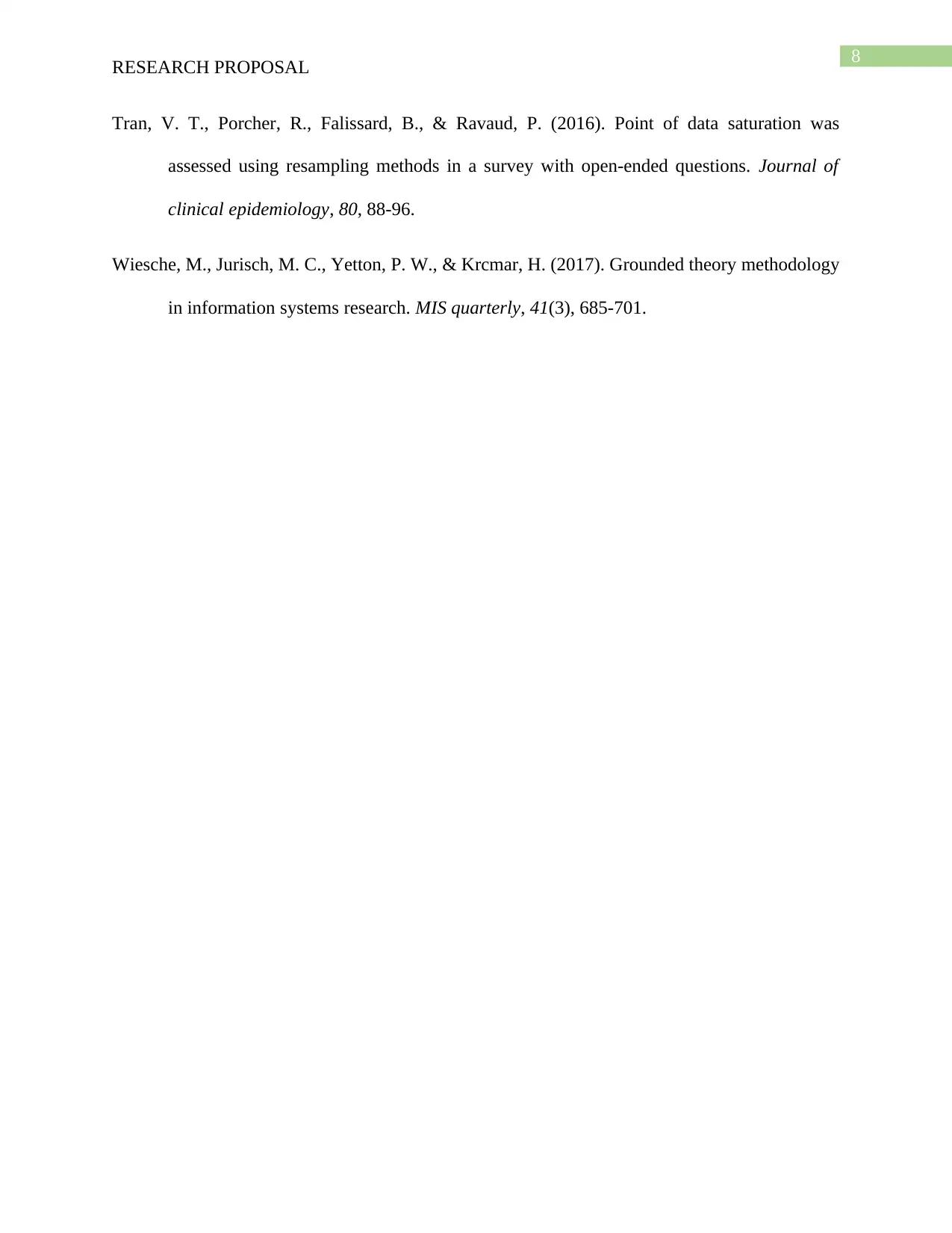
8
RESEARCH PROPOSAL
Tran, V. T., Porcher, R., Falissard, B., & Ravaud, P. (2016). Point of data saturation was
assessed using resampling methods in a survey with open-ended questions. Journal of
clinical epidemiology, 80, 88-96.
Wiesche, M., Jurisch, M. C., Yetton, P. W., & Krcmar, H. (2017). Grounded theory methodology
in information systems research. MIS quarterly, 41(3), 685-701.
RESEARCH PROPOSAL
Tran, V. T., Porcher, R., Falissard, B., & Ravaud, P. (2016). Point of data saturation was
assessed using resampling methods in a survey with open-ended questions. Journal of
clinical epidemiology, 80, 88-96.
Wiesche, M., Jurisch, M. C., Yetton, P. W., & Krcmar, H. (2017). Grounded theory methodology
in information systems research. MIS quarterly, 41(3), 685-701.
⊘ This is a preview!⊘
Do you want full access?
Subscribe today to unlock all pages.

Trusted by 1+ million students worldwide
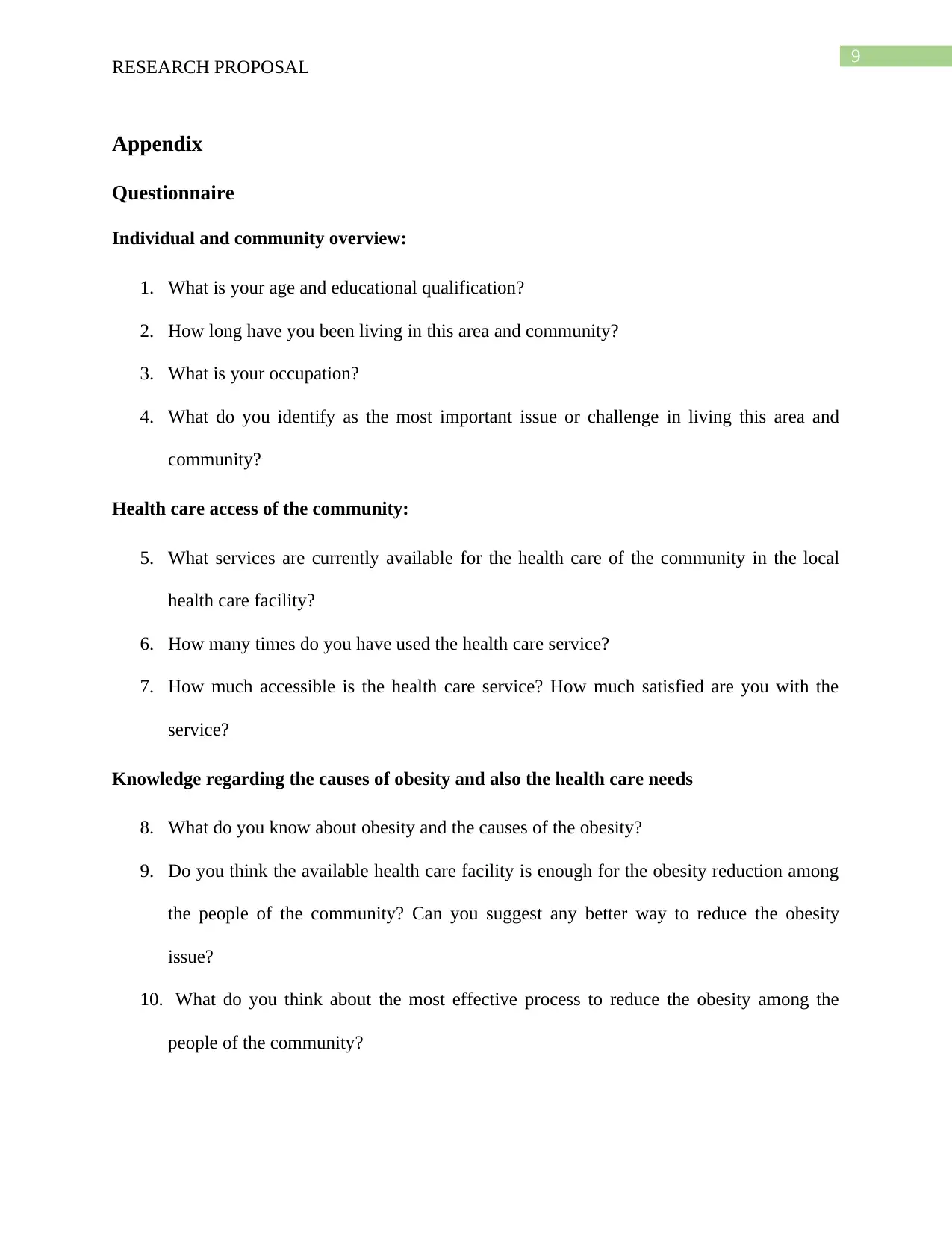
9
RESEARCH PROPOSAL
Appendix
Questionnaire
Individual and community overview:
1. What is your age and educational qualification?
2. How long have you been living in this area and community?
3. What is your occupation?
4. What do you identify as the most important issue or challenge in living this area and
community?
Health care access of the community:
5. What services are currently available for the health care of the community in the local
health care facility?
6. How many times do you have used the health care service?
7. How much accessible is the health care service? How much satisfied are you with the
service?
Knowledge regarding the causes of obesity and also the health care needs
8. What do you know about obesity and the causes of the obesity?
9. Do you think the available health care facility is enough for the obesity reduction among
the people of the community? Can you suggest any better way to reduce the obesity
issue?
10. What do you think about the most effective process to reduce the obesity among the
people of the community?
RESEARCH PROPOSAL
Appendix
Questionnaire
Individual and community overview:
1. What is your age and educational qualification?
2. How long have you been living in this area and community?
3. What is your occupation?
4. What do you identify as the most important issue or challenge in living this area and
community?
Health care access of the community:
5. What services are currently available for the health care of the community in the local
health care facility?
6. How many times do you have used the health care service?
7. How much accessible is the health care service? How much satisfied are you with the
service?
Knowledge regarding the causes of obesity and also the health care needs
8. What do you know about obesity and the causes of the obesity?
9. Do you think the available health care facility is enough for the obesity reduction among
the people of the community? Can you suggest any better way to reduce the obesity
issue?
10. What do you think about the most effective process to reduce the obesity among the
people of the community?
1 out of 10
Related Documents
Your All-in-One AI-Powered Toolkit for Academic Success.
+13062052269
info@desklib.com
Available 24*7 on WhatsApp / Email
![[object Object]](/_next/static/media/star-bottom.7253800d.svg)
Unlock your academic potential
Copyright © 2020–2026 A2Z Services. All Rights Reserved. Developed and managed by ZUCOL.





